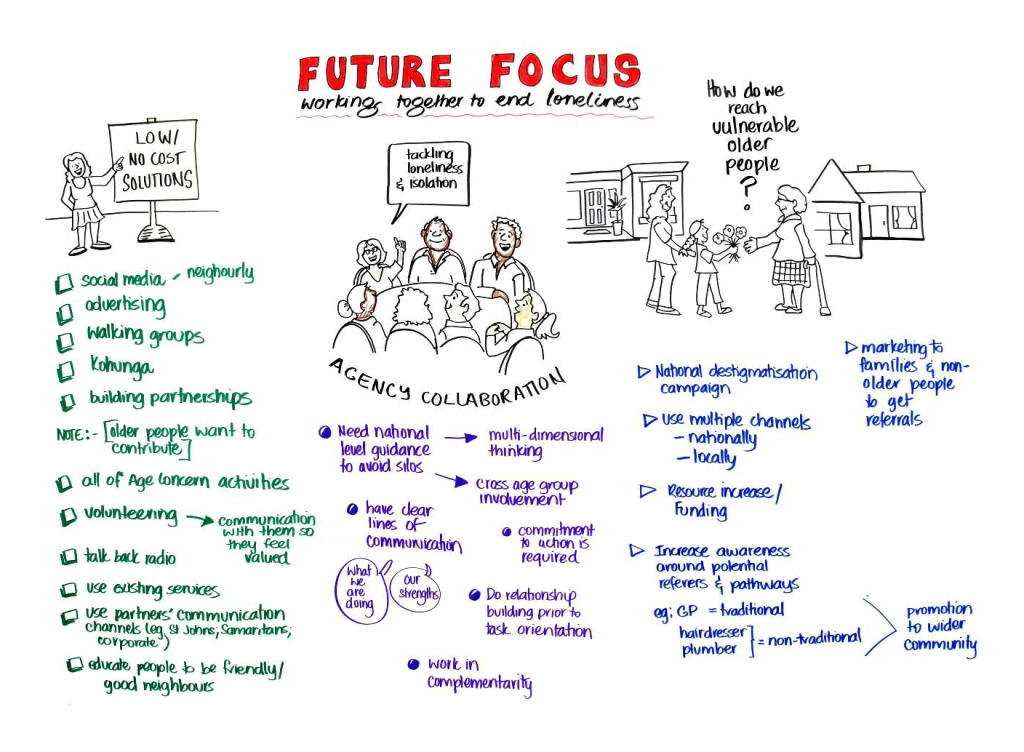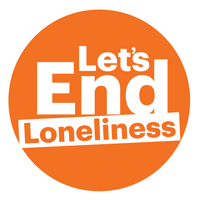Research
Key information on loneliness and social connection
We’ve summarised research and practice information from New Zealand and overseas, to increase understanding of loneliness and support evidence-based action.
Covid-19 and loneliness
A he current pandemic is creating new barriers to connection throughout the world, as well as opportunities to learn new skills, and to connect in different ways. Here is some emerging research and expert commentary relating to social isolation and loneliness under Covid-19 restrictions:
This report from New Zealand Social Wellbeing Agency: Toi Hau Tangata, identifies factors that have exacerbated loneliness and social isolation during Covid-19, and suggests how to mitigate potential ongoing health effects.
The ‘Have Our Say‘ research study currently being conducted by the the Te Arai research group gives New Zealanders over 70 the opportunity to record their experiences during Covid-19 for posterity. The project runs until May 2021.
An overview piece on the dangers of social isolation during a pandemic from the European Public Health Alliance.
A research journal article on a recent 3-year US study showing that our need to connect is as fundamental as our need to eat. The article relates the findings to Covid-19 isolation. The preliminary report on the study is here.
A US article with commentary from some of the leading US experts on loneliness and social isolation, and recommendations on how to stay connected, discussing for instance the value of different forms of virtual communication during lockdown.
A 2022 Canadian study identified loneliness and social support as key factors in relation to workplace burnout during the pandemic. A linked study found that hybrid working appears to optimise worker mental health. Read an article on the research here.
What can we do about loneliness in communities?
In 2018 Age Concern New Zealand held a hui with key stakeholder organisations and commissioned a Horizon poll of 1,000 adult New Zealander’s to explore barriers to social connection and identify solutions to loneliness.
The findings from the Horizon poll report, and feedback from the hui (see below) inspired the formation of our coalition to end loneliness, and the development of this website.

Inspiration from overseas
UK
The UK Joseph Rowntree Foundation published the “Loneliness Resource Kit”, 2013 sharing the process and learning from a large-scale community action research project aimed to identify and generate actions to reduce loneliness.
Key learning was that a community development approach with staff support was highly effective, and that a relatively small investment could bring about significant citizen action.
The UK Campaign to End Loneliness report “Promising Approaches to reducing loneliness and isolation” provides a useful framework to understand and categorize different types of loneliness intervention, with case studies to illustrate each type.
US
In this paper, lead researcher Julian Holt-Lunstad discusses challenges around reducing the health risks of social isolation, and outlines an agenda for integrating social relationships into current public health priorities.
Prevalence and Risk Factors for Loneliness
New Zealand
F16.5% of New Zealanders felt lonely at least some of the time in 2018 compared to 16.9% in 2016, and 13.9% in 2014. A summary of loneliness stats by age, sex, ethnicity and geographic area from the 2014, 2016, and 2018 NZ General Social Survey is available here. The 2018 tables also show stats by sexual identity.
As detailed in The Social Report 2016, factors associated with higher levels of loneliness from the 2014 NZ General Social Survey were:
- Youth (15-24-year-olds were the loneliest age group, with loneliness decreasing with age before rising again for the 75+ group)
- Being female
- Being of Maori or Asian ethnicity
- Having a personal income of $30,000 or less
- Being unemployed
- Living in a sole-parent household with one or more children
- Not living in a family nucleus
- Being a migrant
- 2018 wellbeing stats indicate higher levels of loneliness for people identifying as bisexual, or “other identities”*
*A 2018 submission to the Mental Health Foundation to the government inquiry in mental health and addiction provides evidence of elevated risk of distress, suicide and addiction for the rainbow population, caused by discrimination, prejudice, stigma and social exclusion. Download the inquiry report here.
Further information about loneliness in the context of overall wellbeing in New Zealand is available in the Te Rau Tira Wellbeing Outcomes Report 2021.
A 2017 New Zealand study of 72,000 older people who had received an InterRAI home-care assessment found that 21% of the sample (aged 82.7 years on average) were lonely, and 29% of those living alone.
Recent New Zealand research shows Kiwis living with dementia experience a significant amount of social isolation, stigma and discrimination.
UK
“Getting Carers Connected”, a report released for UK Carers Week 2019, provides evidence of high levels of loneliness amongst carers, particularly for those lacking financial and practical support.
US
A large-scale survey of adults over 45 conducted by the AARP (American Association of Retired Persons) found that one-third of respondents were lonely. Higher rates of loneliness were associated with low income, smaller social networks, physical isolation, LGBTQ status, being an unpaid carer, being never married, divorced, separated, or being unsatisfied with a partner, and not knowing one’s neighbours. The full report is available here.
Health Effects of Loneliness and Social Isolation
The effects of social isolation and loneliness on health, are now increasingly understood.
A 2015 US metanalytic review found that social isolation, loneliness, and living alone increased risk of early mortality by 29%, 26%, and 32% respectively, indicating that both subjective and objective social isolation pose as serious a risk to health as well-established risk factors such as smoking and obesity.
Lead researcher Julianne Holt-Lunstad discusses the results of the study here.
A 2018 US study, discussed here found that loneliness increases the risk of dementia by 40%.
A July 2021 study from Singapore has quantified the effect of loneliness on life expectancy, and on years lived in good health and without physical limitations for people aged 60+.
The cost of loneliness and social isolation
University of Otago study published in 2019, and discussed here found that the following factors increase the likelihood of going into rest home care:
- Feeling lonely (by 20%)
- Living alone (by 43%)
- Having a stressed carer (by 28%)
- Lacking positive social interactions (by 22%)
A 2017 US study found that the federal health care program spends an average of $1,608 more a year for each older person who has limited social connections than for those who are more socially active, amounting to $6.7 billion per year.
Cigna produced a white paper based on findings from their 2020 loneliness index. This reports high levels of workplace loneliness in the US, identifies vulnerable groups, highlights the importance of addressing loneliness both for employee wellbeing and for productivity, and outlines a three-pronged approach that employers can take to reduce loneliness amongst their workers.
Evaluation of interventions
In October 2018, the UK “What Works for Wellbeing” centre published a review of available evidence about what works to tackle loneliness. Findings were that there is a lack of quality evidence, particularly for the under 55 age group, and that evidence relating to older adults consists generally of small-scale studies, lacking consistent definitions and measures, and not capturing the differences in effect for diverse populations. Download the full report and slideshow presentation from here.
Age Concern New Zealand partnered with a research team from Auckland University on a Tranch1, National Science Challenge: Ageing Well study. The study explored how loneliness and social isolation are experienced by older New Zealanders from different cultures, and evaluated the effects of a befriending service, through recruitment of participants from Age Concern’s Accredited Visiting Service. Results are summarised in this presentation given at Age Concern New Zealand’s 2019 “Age Concerns Us” conference.
A UK review of evidence of intergenerational interventions published by Age UK found that positive intergenerational interactions in the workplace, in health and social care settings, in family settings, and particularly through friendships have a range of benefits including: reducing ageist attitudes and behaviours, increased helpful behaviours (volunteering, donating), increased interest in ageing and aged care, lower workplace turnover and reduced anxiety about ageing amongst younger people.
